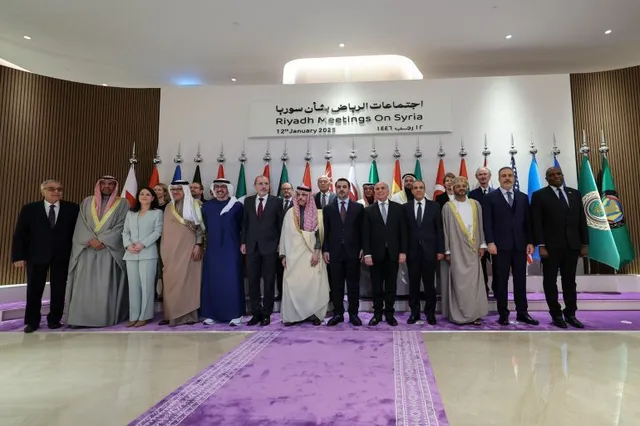On Sunday, January 12, the Saudi capital, Riyadh, hosted an Arab and international meeting aimed at addressing the situation in Syria and stabilizing the country following the fall of the previous regime. The gathering included foreign ministers from Turkey, Syria, and member states of the Gulf Cooperation Council (GCC), alongside representatives from Iraq, Lebanon, Jordan, Egypt, Britain, and Germany. The United States and Italy participated at the level of Deputy Secretary of State.
The presidency of the Riyadh meetings underscored the need to stand in solidarity with the Syrian people during this critical juncture. The focus remained on supporting the political transition process, preserving Syria’s sovereignty and unity, and aiding the Syrian people in rebuilding their nation after years of devastating conflict.
Respect for Syrians’ Choices and Sovereignty
The final communiqué emphasized the necessity of respecting the Syrian people’s choices and their right to self-determination. It reaffirmed Syria’s unity, sovereignty, and territorial integrity, calling for the avoidance of external interference or threats to its security and stability. The statement also highlighted the importance of a comprehensive political process that includes all components of Syrian society and safeguards the rights of all political and social groups.
Addressing Challenges Through Dialogue
The communiqué stressed the need to address challenges and sources of concern for various stakeholders through dialogue and consultation. It reiterated the principle of respecting Syria’s independence and sovereignty, emphasizing that the country’s future should be determined solely by Syrians themselves.
Lifting Sanctions and Supporting Reconstruction
Saudi Foreign Minister Prince Faisal bin Farhan highlighted the meeting’s goal of fostering coordination among countries to support Syria, including efforts to lift the sanctions imposed on it. He welcomed the U.S. decision to grant exemptions from some sanctions, noting that lifting restrictions would enhance humanitarian and economic support, facilitating Syria’s reconstruction and creating a conducive environment for the return of refugees.
Positive Developments in Syria’s New Administration
The Saudi minister commended the positive actions taken by Syria’s new administration, such as preserving state institutions, initiating an inclusive political process with participation from all Syrian factions, and demonstrating a commitment to combating terrorism. He emphasized that Syria should remain a secure state for all its citizens and must not pose a threat to regional stability.
Condemnation of Israeli Actions
Saudi Arabia reiterated its condemnation of Israeli incursions into the buffer zone, describing them as violations of international law and agreements between Syria and Israel. The kingdom called for the immediate withdrawal of Israeli forces from occupied Syrian territories.
Concerns Over Israeli Incursions
The meeting participants expressed deep concern over Israel’s actions in the buffer zone, particularly in Mount Hermon and Quneitra province. They stressed the importance of upholding Syria’s territorial integrity and demanded the withdrawal of Israeli occupation forces in accordance with international law.
This communiqué reflects the collective determination of participating states to support Syria in its path to recovery and political stability, while reinforcing principles of sovereignty, dialogue, and non-intervention.
This article was translated and edited by The Syrian Observer. The Syrian Observer has not verified the content of this story. Responsibility for the information and views set out in this article lies entirely with the author.


